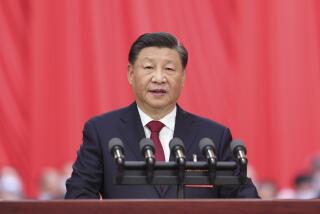TV REVIEW : ‘Mao Years’ Sheds Light on Series of Ruthless Campaigns
- Share via
Slogans and sayings ran through Mao Tse-tung years as supreme ruler of China like an unbroken performance. But a saying Maoism didn’t invent seems to sum up his regime: Be careful what you wish for; it may come to pass. Sue Williams’ two-hour depiction of “The Mao Years” on PBS shows a budding nation caught in the grip of one man’s political imagination.
The possibilities Mao envisioned were what propelled his Communist army to victory in 1949--that, and a ruthless military ability that he would later employ against his own people. The Mao ideal of a China with industrial and agricultural muscle pumped by a peasant working class always conflicted with reality.
It produced one absurd and tragic episode after another, any one of which would have toppled a mere leader. Williams shows how Mao inoculated himself against this danger by developing a cult that turned him into a God in human form.
The results were horrifying. Through the mid-’50s, when China boosted industrial production and fought the United States to a stand-off in Korea, things looked good. But the urge to fund industry through grain production, which led to “The Great Leap Forward,” culminated in bitter resistance to collectives and, finally, mass starvation.
The casualty numbers during Mao’s rule are truly awesome. Even before 30 million died in the starvation of 1959-61, hundreds of thousands of landlords were killed by revolutionary zealots. (And ‘60s zealots killed hundreds of thousands more.) Each policy shift by Mao created new enemies of the state, new denunciations of “counter-revolutionaries,” new prisoners, new deaths. Those, for example, who had supported his “Let 100 Flowers Bloom” campaign of criticism of party policies were trapped when Mao condemned the campaign.
Indeed, Mao’s rule seemed to be a series of campaigns, each more disastrous than the next. At the same time, Williams reveals the human cost in the faces of those, like Li Maoxiu and Ding Xueliang, who witnessed public beatings and whole families and villages wiped out. Ding’s case is especially interesting. He saw people try to eat dirt to stay alive in the farmlands. Later, in the city, he joined the youth-driven red guard of Mao’s “Cultural Revolution.”
This campaign of the ‘60s urged youth to literally take over the party and all institutions. Behind it, though, was Mao’s intent to curb nominal head of state Liu Siaoqui, a moderate.
The Cultural Revolution never made sense, and Williams doesn’t provide any new insight into it--despite many revealing recollections by Mao’s personal doctor, Li Zhisui. A street civil war erupted, nearly tearing the country apart and forcing Mao to once again reverse himself and finally open a door to the United States and Richard Nixon. Mao couldn’t keep the outside world and the capitalists out, despite his imaginings of a permanent revolution. “The Mao Years,” with a bevy of remarkable and rare archival footage, starkly presents the costs when such imaginings have power.
More to Read
Sign up for Essential California
The most important California stories and recommendations in your inbox every morning.
You may occasionally receive promotional content from the Los Angeles Times.













